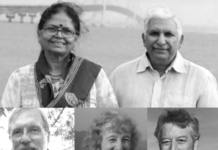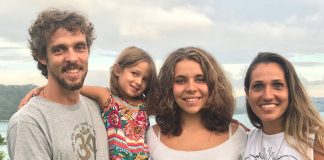July is vacation month: a short winter vacation in the southern hemisphere, and a long and celebrated summer vacation in the northern hemisphere. It was in this atmosphere of school break, of travels and encounters, that I talked to Ghrii Acarya Devanistha (Jody Wright). I, in Florianópolis, SC (Brazil), in the south of the country, visiting my family, she at her residence in Massachusetts, in the northern United States. I, surrounded by my daughter and nephews, she, with her husband and her five daughters. We speak of affection, exchange, support and gratitude, that feeling that creates connection with the divine and satisfaction with life, vitality and optimism.
“Devanistha, what are you grateful for?” I ask her. “Certainly for having found Baba so early in my life. I was 19 years old when I learned meditation and it’s been 45 years, “she responds immediately. Gratitude extends to her family, consisting of her husband, Prakash Laufer, to whom she has been married for 42 years, and her five daughters. “I am grateful to have been able to adopt four of them and I feel very lucky that they grew up in such a caring atmosphere. No matter where I go or what I do, I always feel a sense of care. And I try to work hard while moving toward Baba, and so I release my samskaras. “
Unable to conceive, Devanistha adopted two girls, Ananda Mayii and Mahajoy, one Filipina and the other African. After surgery, the third girl, Liina, came from her own womb. And then came Emily, the youngest one, but the forth to arrive, adopted from a family with a white mom and an African American father, and finally, Sundarii, who is the third oldest one, who had reached the age of 11, from an Ananda Marga orphanage in Haiti.
Fourteen years ago, when her youngest daughter was already a teenager, Didi Devanistha became a family Acarya, taking responsibility for initiating both women and men. However, as the member of a family, she says that she has chores and she has to support herself. So her time is limited, but her commitment to accomplishing Baba’s mission is great. In her city, Northampton, Massachusetts, USA, 3 hours from New York and 2 hours from Boston, she leads the local collective of ananda margiis, who hold a small dharmacakra; provides assistance with regional and national retreats; and helps to organize international meetings, in addition to participating in Prout study groups and events.
Devanistha works hard, and the way she tells me her story sounds sweet and determined. Some of her oldest work is in Prout. “Baba talked to me about Prout when I visited him in prison in 1978 in India. He told me that everyone should work for Prout, because if people do not have food, they cannot do sadhana. Having a solid and supportive world system that guarantees the needs of all directly affects people’s spiritual progress.”
Devanistha likes to remember this deeply defining episode in her life. The fruit of this is Women’s Proutist https://www.proutwomen.org/ , a website for women with high-quality political, economic, social and cultural content, available in English and Spanish. In parallel, she works, along with a team of writers, on one of the oldest Ananda Marga newsletters, The Rising Sun, for women’s empowerment, published twice a year and accessible through Women’s Proutist.
Another major work is being a trainer for baby massage instructors, a craft she learned alongside Vimala McClure, a margii sister. “When Vimala went to India for training, she worked in an orphanage and there she saw the older girls massaging the babies. Back home, she began practicing with her children and developed her own method, including Swedish and Indian massage, reflexology and baby yoga.” (http://www.iaim.net/)
She tells us that the special point of this technique is that the massage is done with the child, not for the child. “Parents ask for permission, the child gives it, it’s a dialogue. It is a massage designed to create and increase communication, affection and appreciation between parents and children. Beginning with a greater understanding of the baby’s needs, parents and children get closer and the relationship improves. It’s a way to live the love.”
Devanishta, whose name means ‘devoted to God’, tells us that she has observed in these 45 years of meditation that all sadhakas experience ups and downs in their practice. “There are times of abundance in meditation and also times of drought in sadhana, where we have to fight. I think I’ve learned to deal with those meager times and understand that they do not mean that you’ve stopped. It’s just the way it is. But you have to continue and soon things will become better, and then again they will deteriorate. Nothing lasts forever; they are cycles.”
By Taruna (Tatiana Achcar)







